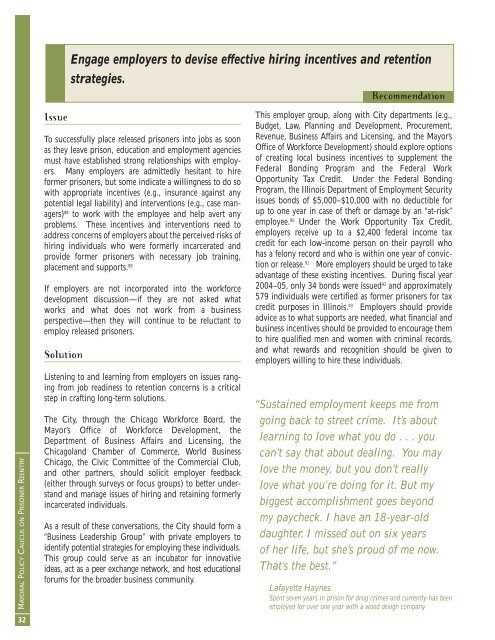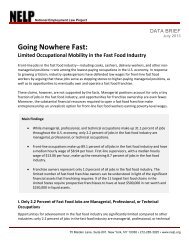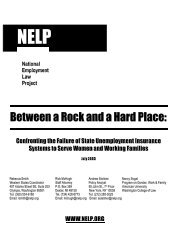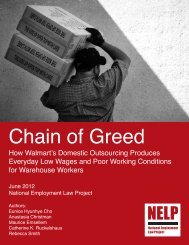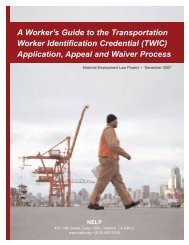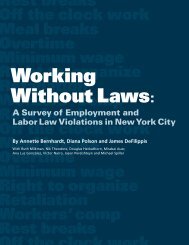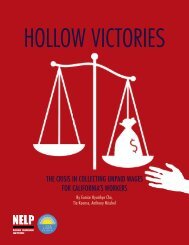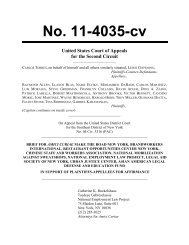Rebuilding Lives. Strengthening Communities.
Rebuilding Lives. Strengthening Communities.
Rebuilding Lives. Strengthening Communities.
Create successful ePaper yourself
Turn your PDF publications into a flip-book with our unique Google optimized e-Paper software.
Engage employers to devise effective hiring incentives and retention<br />
strategies.<br />
Recommendation<br />
MAYORAL POLICY CAUCUS ON PRISONER REENTRY<br />
32<br />
Issue<br />
To successfully place released prisoners into jobs as soon<br />
as they leave prison, education and employment agencies<br />
must have established strong relationships with employers.<br />
Many employers are admittedly hesitant to hire<br />
former prisoners, but some indicate a willingness to do so<br />
with appropriate incentives (e.g., insurance against any<br />
potential legal liability) and interventions (e.g., case managers)<br />
88 to work with the employee and help avert any<br />
problems. These incentives and interventions need to<br />
address concerns of employers about the perceived risks of<br />
hiring individuals who were formerly incarcerated and<br />
provide former prisoners with necessary job training,<br />
placement and supports. 89<br />
If employers are not incorporated into the workforce<br />
development discussion—if they are not asked what<br />
works and what does not work from a business<br />
perspective—then they will continue to be reluctant to<br />
employ released prisoners.<br />
Solution<br />
Listening to and learning from employers on issues ranging<br />
from job readiness to retention concerns is a critical<br />
step in crafting long-term solutions.<br />
The City, through the Chicago Workforce Board, the<br />
Mayor’s Office of Workforce Development, the<br />
Department of Business Affairs and Licensing, the<br />
Chicagoland Chamber of Commerce, World Business<br />
Chicago, the Civic Committee of the Commercial Club,<br />
and other partners, should solicit employer feedback<br />
(either through surveys or focus groups) to better understand<br />
and manage issues of hiring and retaining formerly<br />
incarcerated individuals.<br />
As a result of these conversations, the City should form a<br />
“Business Leadership Group” with private employers to<br />
identify potential strategies for employing these individuals.<br />
This group could serve as an incubator for innovative<br />
ideas, act as a peer exchange network, and host educational<br />
forums for the broader business community.<br />
This employer group, along with City departments (e.g.,<br />
Budget, Law, Planning and Development, Procurement,<br />
Revenue, Business Affairs and Licensing, and the Mayor’s<br />
Office of Workforce Development) should explore options<br />
of creating local business incentives to supplement the<br />
Federal Bonding Program and the Federal Work<br />
Opportunity Tax Credit. Under the Federal Bonding<br />
Program, the Illinois Department of Employment Security<br />
issues bonds of $5,000–$10,000 with no deductible for<br />
up to one year in case of theft or damage by an “at-risk”<br />
employee. 90 Under the Work Opportunity Tax Credit,<br />
employers receive up to a $2,400 federal income tax<br />
credit for each low-income person on their payroll who<br />
has a felony record and who is within one year of conviction<br />
or release. 91 More employers should be urged to take<br />
advantage of these existing incentives. During fiscal year<br />
2004–05, only 34 bonds were issued 92 and approximately<br />
579 individuals were certified as former prisoners for tax<br />
credit purposes in Illinois. 93 Employers should provide<br />
advice as to what supports are needed, what financial and<br />
business incentives should be provided to encourage them<br />
to hire qualified men and women with criminal records,<br />
and what rewards and recognition should be given to<br />
employers willing to hire these individuals.<br />
“Sustained employment keeps me from<br />
going back to street crime. It’s about<br />
learning to love what you do . . . you<br />
can’t say that about dealing. You may<br />
love the money, but you don’t really<br />
love what you’re doing for it. But my<br />
biggest accomplishment goes beyond<br />
my paycheck. I have an 18-year-old<br />
daughter. I missed out on six years<br />
of her life, but she’s proud of me now.<br />
That’s the best.”<br />
Lafayette Haynes<br />
Spent seven years in prison for drug crimes and currently has been<br />
employed for over one year with a wood design company


